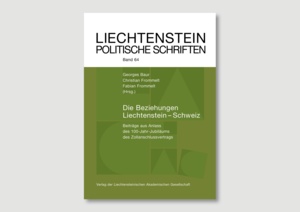Die Beziehungen Liechtenstein–Schweiz│Präsentation LPS 64
St. Luziweg 2
Auf dem Kirchhügel
LI 9487 Gamprin-Bendern
Präsentation der Publikation
Die Beziehungen Liechtenstein–Schweiz
Beiträge aus Anlass des 100-Jahr-Jubiläums des Zollanschlussvertrags
LPS 64, Gamprin-Bendern 2024
ISBN 978-3-7211-1102-3
With contributions by Georges Baur, Cyrus Beck, Andreas Brunhart, Christian Frommelt, Fabian Frommelt, Martin Geiger, Cornelius Goop, Thomas Milic, Beat Ospelt, Lukas Ospelt, Rupert Quaderer, Philippe Rochat, Patricia M. Schiess Rütimann.
Program |
|
| Welcome address | Thomas Meier, Director of the Liechtenstein Institute |
| About the publication | Georges Baur, Christian Frommelt, Fabian Frommelt, Editors |
| Concluding remarks | Emanuel Schädler, Publishing Director |
| Followed by aperitif |
About this volume
The occasion for this volume is the centenary of the Customs Union Treaty between Liechtenstein and Switzerland. Even though the Customs Treaty is not seriously questioned by anyone on the Liechtenstein side today, it has always been viewed critically for fear of a loss of sovereignty. The history of the relationship between Liechtenstein and Switzerland is complex and exciting, not least because relations between the two countries are no longer limited to the customs treaty, but have expanded to numerous levels of economic and everyday life.
This volume takes these diverse relationships into account. The articles show that it is hard to imagine everyday life in Liechtenstein without the now more than one hundred agreements, as they not only concern customs and trade issues, but also countless other cross-border challenges such as road traffic, healthcare and waste disposal. It is also clear that treaties no longer exist only between Liechtenstein and the Swiss Confederation, but also between the country and the cantons or between the municipalities. The fact that Liechtenstein joined the EEA in 1995 and thus decided to participate in the European Economic Area while retaining the customs treaty profoundly changed the relationship between the two neighboring countries.
This book, to which authors from various disciplines have contributed, is just as colorful and multifaceted as the development of the relationship between Liechtenstein and Switzerland. They analyze the complex network of relationships from a historical, legal, economic and political perspective, the cornerstone of which was laid by the Customs Treaty.









